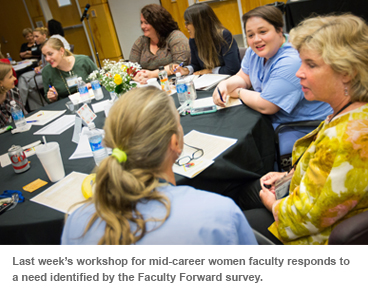Listening to Our Faculty
Good morning!
Last week I had the honor of serving as the keynote speaker at a two-day workshop focused on career planning and development for mid-career women faculty at UMMC.
 The event, attended by 36 faculty from all of our schools, touched on topics such as cultivating sponsors (as opposed to mentors) for career advancement, the art of negotiation and how a faculty member's communication style may be helping or hindering her career.
The event, attended by 36 faculty from all of our schools, touched on topics such as cultivating sponsors (as opposed to mentors) for career advancement, the art of negotiation and how a faculty member's communication style may be helping or hindering her career.
The workshop was co-sponsored by the Office of Faculty Affairs and our chapter of the Group on Women in Medicine and Science. Most notable to me, however, is that an offering like this is exactly what our faculty told us they wanted - through the 2016 Faculty Forward survey.
A brief recap: Faculty Forward was created by the Association of American Medical Colleges to assess faculty engagement - defined as attitudes toward one's workplace experiences (i.e., job satisfaction) - and many other factors that play into a faculty member's professional experience. Our medical school participated in the vanguard survey in 2009. The survey was later broadened to include faculty of other health professions schools, and all of our faculty participated in surveys in 2015 and 2016.
In the most recent survey, UMMC had a 74 percent participation rate among all faculty on campus - one of the highest in the nation - and the overall satisfaction rate of our faculty was 70 percent compared to the national average of 65 percent.
Other positives included high satisfaction with “my job” (SOM 81 percent; other schools 88 percent) and with the levels of “collegiality and collaboration” (SOM 77 percent; other schools 83 percent).
The real value of Faculty Forward, of course, is in finding out where we can improve. Following the last survey, a 10-person task force of leaders from across UMMC reviewed the results and submitted recommendations for further action.
Major areas of focus have been and continue to be:
- Leadership communication/transparency about such issues as finance and budgeting, decision-making and governance;
- Faculty development;
- Promotion, tenure and compensation;
- Input into work (a.k.a., participatory management); and
- Issues around research (training opportunities, protected time and improving research infrastructure).
From the very first survey we learned that a major point of faculty concern and uncertainty in the School of Medicine involved the promotion and tenure processes. In response, SOM leaders, the Office of Faculty Affairs and the Office of Academic Affairs worked for several years with the Promotion and Tenure Committee to modify our policies and procedures. Our process today is much improved because of these efforts.
Faculty also indicated they want increased venues of communication. As a result, we developed a task force that looked critically at communication modalities. Based on their recommendations, new communication tools were put in place, including VC Notes and the Clinical Intranet, and we have used other venues, such as Leadership Rounds and faculty meetings, to enhance communication and discuss topics of special interest such as UMMC finances.
We've worked on the faculty's desire for more involvement in administrative matters in a number of ways. We've restructured our administrative leadership councils and committees to enhance faculty input and participation, among other objectives. We've included faculty in the health system's “100-day workout” activities and broadened faculty participation in Leadership Rounds. And we've begun adopting a dyad management model for some of our clinical activities to include administrative and clinician leads working in tandem.
As noted above, we are expanding our menu of offerings to support faculty with career development, an effort that has been embraced by deans and department heads. As was demonstrated with last week's event, sometimes we are able to achieve a great benefit to faculty at only modest expense.
Last spring we provided every school and department with their respective unit-level results from the 2016 survey. We asked deans and department chairs to select one or two priority items to work on and to provide a progress report next spring.
I want to give a special thanks to our Faculty Affairs staff - Dr. Patrick Smith, Johnson George and Vickie Skinner - for not only shepherding the survey process, but for analyzing the results and leading the effort to make improvements. I believe we are getting as much or more value from this initiative as any of our peer institutions.
My message to you is that Faculty Forward is making a difference. We've made many changes for the better and many more will be forthcoming; I've only touched on a few here. Our next survey is not until the fall of 2018, but this is truly an exercise in continuous improvement that never ends. Thank you for sharing your ideas. They are not only welcome but needed, as we all strive for excellence and A Healthier Mississippi.



